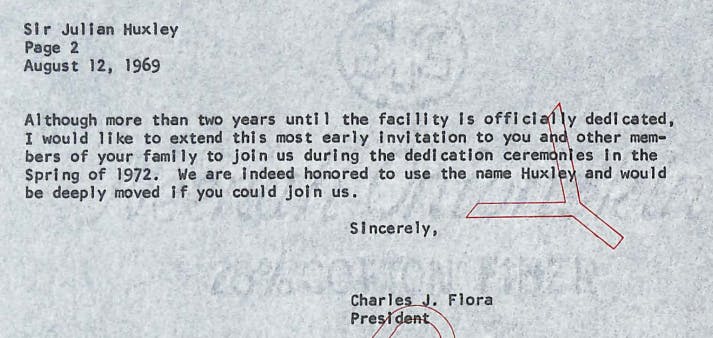More than a year after Thomas Huxley’s name was removed from Western Washington University’s College of the Environment, the college has not been renamed.
Following the Legacy Review Task Force’s unanimous recommendation to remove Huxley’s name, Western’s Board of Trustees voted for the removal Dec. 9, 2021.
Huxley, a 19th-century British biologist, championed Charles Darwin’s theory of evolution but also upheld tenets of scientific racism.
The Legacy Review Task Force was formed in response to the Black Student Coalition’s -- formerly named the Black Student Organization - demands, including removing the “Huxley” name.
“The change was initially proposed by a group of students,” said Miles Butler, an environmental science pre-major at Western. “And I think that an important part of any educational institution is to follow what the students want.”
Butler’s remarks come almost a year after The Front documented the debate over the name change.
Teena Gabrielson, the dean of the College of the Environment, said the college’s excellence stems from the leadership of faculty and students who want to make a difference.
“While the deliberative process and decision occurred prior to my arrival, I fully support the intentions behind it,” Gabrielson said in an email. “It is important to see that this was not an isolated decision, but part of a larger initiative dedicated to creating a more inclusive and equitable culture at Western and within the College of the Environment.”
Gabrielson wrote in an op-ed that only 17% of College of the Environment majors identify as students of color. As of Fall 2022, Western has 14,747 students and 28.3% of them are students of color.
In May 2021, Steve Hollenhorst, former dean of the College of the Environment, and Wayne Landis, former director and professor emeritus at Western’s Institute of Environmental Toxicology and Chemistry, co-authored a Seattle Times op-ed opposing the change.
“Huxley’s early writings did reflect the prevailing bigotry and prejudice of Victorian society, although even then to a lesser degree than his scientific peers,” wrote Hollenhorst and Landis. “By the 1860s, he became a vocal abolitionist and by the end of his life called for universal equal rights regardless of race or gender.”
Josh Cerretti, a member of Western’s Legacy Review Task Force and associate professor of history, objected to their claims of historical presentism.
“[Hollenhorst] used a tortured understanding of historical analysis to try to rescue him from the label of white supremacist that is rightfully applied,” said Cerretti.
In his 1865 essay “Emancipation: Black and White,” Huxley argues Black people are inferior and abolitionists foremost sought to absolve the white conscience.
“The British Empire abolished slavery in the 1830s,” said Cerretti. “[Huxley] is writing even after two-thirds of the U.S. Congress has voted to pass the 13th Amendment and abolish slavery. So his position is merely endorsing what politicians decades before him were already willing to do.”
Cerretti added that Western invited Julian Huxley, president of the British Eugenics Society and Thomas Huxley’s grandson, to campus for the College’s dedication in 1969.

A 1969 letter from Western Washington State College President Charles Flora inviting Julian Huxley to fledgling Huxley College’s dedication ceremony. Julian Huxley was the president of the British Eugenics Society and Thomas H. Huxley’s grandson, a troubling symbol of the latter’s legacy. // Courtesy of University Archives
“Thomas Huxley was clearly a scientific racist,” said Richard Bellon, an associate professor of the history of 19th-century science at Michigan State University. “He’s explicit about this. He’s saying that the average African is not as intelligent.”
Bellon said Huxley also believed all human beings were one species, unlike the polygenists of his day. Huxley challenged the notion that eugenics or selective, racialized breeding would lead to a utopian society.
“Actual historical knowledge isn’t going to change the debate,” Bellon said. “I think these are the questions about who we celebrate as opposed to who we understand.”
The Legacy Review Task Force concluded Huxley had no relation to Western. He was chosen based on intellectual virtues.
“Edens Hall is named after someone who contributed greatly to the area,” Butler said. “I think buildings should carry a special significance to the institution as opposed to a name pulled out of a history book.”
Opinions vary on whether to rename the College of the Environment after a figure who better reflects Western’s values.
“I’m in the College of Humanities and Social Sciences,” said Cerretti. “We’re not a named college. It really doesn’t have too much of an impact either way.”
The Black Student Coalition’s demands stated, “rename Huxley College,” calling for the Board of Trustees to rename old buildings and name new buildings after historical Black figures.
“I’m a professor in the Lyman Briggs College,” said Bellon. “It’s a science program. Almost nobody knows who Lyman Briggs is. One of the things I think is, should we change the name? Not because Lyman Briggs was offensive in any way. He just doesn’t speak to anybody in the 21st century.”
“One of the department heads of the College of the Environment proposed that [it] be named ‘Camas College of the Environment,’” said Butler. “I personally agree with that because it’s been such a staple to a lot of the tribes in the area like the Puyallup or the Kalapuya in Oregon.”
Gabrielson said the college is moving forward as “College of the Environment.” Its Strategic Visioning Committee is identifying priorities to direct the college’s focus over the next five years.
Mia Limmer-Lai (she/her) is one of two copy editors for The Front this quarter. She is a second-year environmental studies and journalism student at Western with a minor in honors interdisciplinary studies. In her free time, she enjoys reading books and listening to punk music. You can reach her at mianlimmerlai.thefront@gmail.com.






